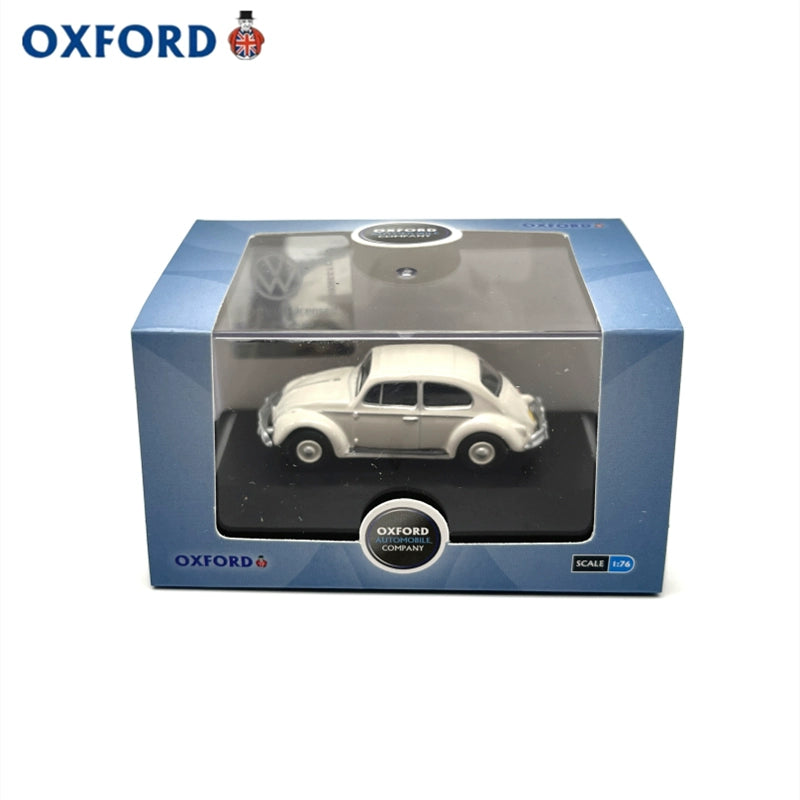old boy hobby
1/76 Scale Volkswagen Beetle White Diecast Model Car
1/76 Scale Volkswagen Beetle White Diecast Model Car
Couldn't load pickup availability
- diecast and pre-painted, ready to display
- material: metal
- scale: 1/76
- size: 5.4*2*1.9 cm
The Volkswagen Beetle—officially the Volkswagen Type 1, is an economy car that was built by the German company Volkswagen (VW) from 1938 until 2003. It has a rear-engine design with a two-door body style and is intended for five occupants (later, Beetles were restricted to four people in some countries).
The need for a people's car (Volkswagen in German), its concept and its functional objectives were formulated by the leader of Nazi Germany, Adolf Hitler, who wanted a cheap, simple car to be mass-produced for his country's new road network (Reichsautobahn). Members of the National Socialist party, with an additional dues surcharge, were promised the first production, but the Spanish Civil War shifted most production resources to military vehicles to support the Nationalists under Francisco Franco.
Lead engineer Ferdinand Porsche and his team took until 1938 to finalise the design. Béla Barényi is credited with conceiving the original basic design for this car in 1925, notably by Mercedes-Benz, on their website, including his original technical drawing, five years before Porsche claimed to have done his initial version. The influence on Porsche's design of other contemporary cars, such as the Tatra V570, and the work of Josef Ganz remains a subject of dispute. The result was the first Volkswagen, and one of the first rear-engined cars since the Brass Era. With 21,529,464 produced, the Beetle is the longest-running and most-manufactured car of a single platform ever made.
Although designed in the 1930s, due to World War II, civilian Beetles only began to be produced in significant numbers by the end of the 1940s. The car was then internally designated the Volkswagen Type 1, and marketed simply as the Volkswagen. Later models were designated Volkswagen 1200, 1300, 1500, 1302, or 1303, the first three indicating engine displacement, the last two derived from the model number.
The car became widely known in its home country as the Käfer (German for "beetle", cognate with English chafer) and was later marketed under that name in Germany, and as the Volkswagen in other countries. For example, in France it was known as the Coccinelle (French for ladybug).
The original 18.6 kW (24.9 hp) Beetle was designed for a top speed around 100 km/h (62 mph), which would be a viable cruising speed on the Reichsautobahn system. As Autobahn speeds increased in the postwar years, its output was boosted to 27 kW (36 hp), then 30 kW (40 hp), the configuration that lasted through 1966 and became the "classic" Volkswagen motor. The Beetle gave rise to multiple variants: mainly the 1950 Type 2 'Bus', the 1955 Karmann Ghia, as well as the 1961 Type 3 'Ponton' and the 1968 Type 4 (411/412) family cars, ultimately forming the basis of an entirely rear-engined VW product range.
The Beetle marked a significant trend, led by Volkswagen, and then by Fiat and Renault, whereby the rear-engine, rear-wheel-drive layout increased from 2.6 percent of continental Western Europe's car production in 1946 to 26.6 percent in 1956. In 1959 even General Motors launched an air-cooled, rear-engined car, the Chevrolet Corvair—which also shared the Beetle's flat engine and swing axle architecture.
Over time, front-wheel drive, and frequently hatchback-bodied cars would come to dominate the European small-car market. In 1974, Volkswagen's own front-wheel drive Golf hatchback succeeded the Beetle. In 1994, Volkswagen unveiled the Concept One, a "retro"-themed concept car with a resemblance to the original Beetle, and in 1998 introduced the "New Beetle", built on the contemporary Golf platform with styling recalling the original Type 1. It remained in production through 2010, and was succeeded in 2011 by the Beetle (A5), the last variant of the Beetle, which was also more reminiscent of the original Beetle. Production ceased altogether by 2019.
In the 1999 Car of the Century competition, to determine the world's most influential car in the 20th century, the Type 1 came fourth, after the Ford Model T, the Mini, and the Citroën DS.
--copied from Wikipedia
Share














